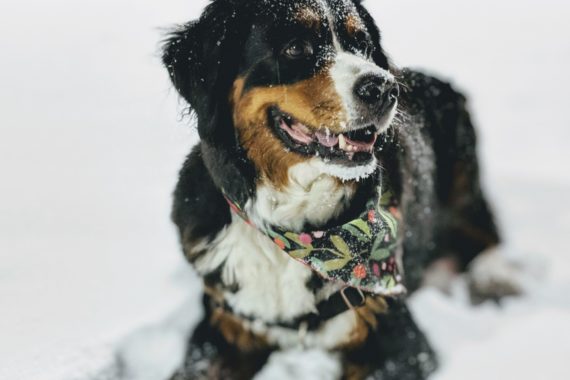Keeping Your Dog Warm from Nose to Tail

Winter weather is here! It’s important to keep your dog’s safety top of mind all year long, but winter can bring some new elements to consider and to be aware of. Keep your dog safe and warm in the chilly and snowy winter months with the help of these tips:
Ensure Your Dog is Staying Warm
Winter weather can be as dangerous for dogs as it is for humans. If you notice you are cold when you step outside, there is a good chance your dog is cold, too. A dog’s nose, ears, paws and tail can experience permanent damage if frozen. Quick bathroom breaks are expected, but dogs should be mainly kept warm indoors during extreme weather conditions. If you believe your dog is experiencing frostbite, wrap them in a blanket or towel, move them to a warm area and contact your veterinarian for immediate support.
Regularly Check Paws for Damage and Ice Buildup
Keep an eye on your dog’s paws for cold-weather injuries such as cracked, scraped or bleeding paw pads. Sidewalks can become icy and slippery in the winter. It may be hard for humans and dogs to gain traction, so many cities will have salt thrown on the ground to provide better grip. This is helpful; however, it may get caught in your dog’s paw pads and create an uncomfortable buildup. To ensure your dog is comfortable and free of any buildup of ice or salt, check their paws frequently and cleanse with a warm towel after they return inside. Regular grooming will also prevent the buildup of snow and other winter materials because the hair between paw pads will be trimmed.
Keep Your Dog Safe in the Car
Did you know a dog being left alone in the car in the winter is just as dangerous as being left in a car in the summer? Cars retain the cold temperature making it easy for the vehicle to become too cold for your dog. If you plan to take your dog on your everyday errands this winter, consider starting the car and allowing it to warm up before allowing your pup to jump in for a ride. If temperatures are low, do not leave your dog in the car unattended while running your errands.
Watch Out for Winter Chemicals
During the winter, chemicals such as antifreeze are commonly used. Antifreeze is a dangerous chemical to a dog because it smells and tastes sweet but is toxic and dangerous for a dog’s kidneys. If you notice antifreeze has spilled anywhere in your garage, home or yard, clean it up immediately to avoid any risk of your dog ingesting it. Designate an area to store antifreeze and other toxic chemicals out of reach of your dog. As an alternative for homes with pets, locate an antifreeze coolant made with propylene glycol, which is less toxic than the traditional antifreeze made with ethylene glycol.
Keep Your Dog Dry
Wet fur can quickly freeze in extreme winter temperatures and conditions. When fur is cold, your dog is cold. Keep your dog free of frostbite and illness by drying off your dog if you plan to play with them in snow, ice or water in the winter months.
Winter weather can be a welcome change, but it is best to think critically and safely about your dog’s health. If it’s too cold for you, it is likely too cold for your dog. As we head into the colder months, keep your dog indoors to prevent illness. Worried your dog won’t get enough exercise this winter? Take them to your local Dogtopia daycare! Dogtopia daycares have temperature-controlled playrooms which allow pups to play the day away regardless of the weather outside. Find a Dogtopia near you so your dog can spend their days socializing with their BFFFs (Best Furry Friends Forever) all winter long!







